Hildago
 for adventure violence and some mild innuendo
for adventure violence and some mild innuendoReviewed by: Brett Willis
STAFF WRITER
| Featuring: | Viggo Mortensen “The Lord of the Rings” trilogy, “Crimson Tide,” “G.I. Jane” Zuleikha Robinson “Timecode,” “Slash” Omar Sharif “Lawrence of Arabia,” “Doctor Zhivago,” “Funny Girl,” “The 13th Warrior” Louise Lombard, Adam Alexi-Malle, Saïd Taghmaoui, Silas Carson, Harsh Nayyar |
| Director: | Joe Johnston “Honey, I Shrunk the Kids,” “Jumanji,” “October Sky,” “Jurassic Park” III |
| Producer: | Casey Silver |
| Distributor: | Touchstone/Buena Vista |
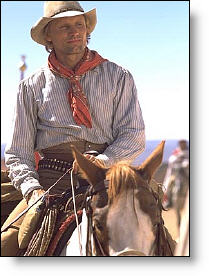
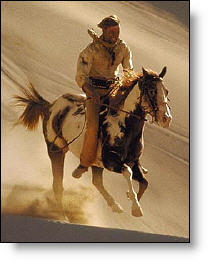
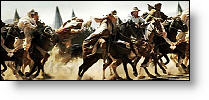
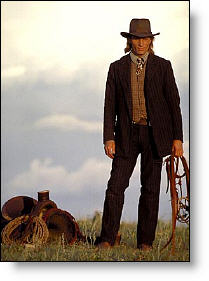
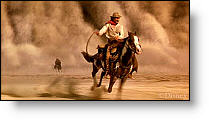
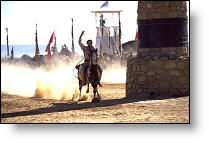
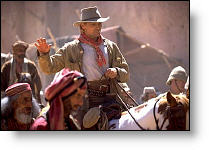
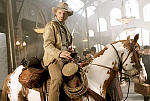
This is an old-fashioned Western hero story, an enjoyable genre that has become quite rare. It does have Political Correctness, with a sympathetic appearance by Floyd Red Crow Westerman of “Dances With Wolves,” and even a nod to “Spirit: Stallion of the Cimarron” (which was penned by the same writer). But the main character is a can’t-be-bought type through and through.
It’s 1890, and former Pony Express rider Frank T. Hopkins is best known for winning endurance races on his painted Mustang horse, Hidalgo. But he’s also employed by the U.S. Military as a sort of courier/scout, and one day is given a packet of orders to carry to the 7th Cavalry at Wounded Knee. In the aftermath of the massacre, the conflicted Hopkins (who is part Native American) turns to hard drinking and to doing silly performances in Buffalo Bill’s Wild West show. This character introduction is similar to that of Tom Cruise in “The Last Samurai.” The similarity continues as Hopkins eventually travels overseas to get away from it all.
A rich visitor from Arabia attends the Wild West show, and challenges Buffalo Bill to either stop billing Hidalgo as the world’s best endurance racehorse, or else put the claim to the test by letting Hopkins enter the annual 3000-mile “Ocean of Fire” race across the Arabian Desert, Iraq and Syria. The winner’s purse is $100,000. Hopkins doesn’t intend to enter. but Annie Oakley collects money from everyone in the show, and hands Hopkins the entry fee.
There are about a hundred other horses and riders in the race, but only three of them will be main characters. Hopkins is the only “foreigner infidel,” and many people consider it sacrilege that he’s even competing. There’s a major subtheme of deflating Arab/Muslim pride in their own superiority and that of their Arabian horses. Some folks are honorable and accept the premise of a fair race, leaving the results to the will of Allah. But others try various means of “fixing” the race (kidnapping riders or their horses, depriving contestants of water etc.).
Hopkins behaves honorably throughout, ignoring both threats and bribes (a rich Western woman who owns one of the racehorses offers Hopkins a large sum of money to drop out, which he refuses; then she offers herself, which he also refuses). Hopkins also manages to take time out from the race to rescue a Sheikh’s kidnapped daughter.
Considering the genre, if you guess beforehand at the outcome of the race, you’ll probably be correct. But the film’s overall ending has some surprises and ties up several loose ends.
The violence is heavy at times, with a large body count. But it’s done in a mostly-bloodless and surreal style similar to that of the adventure sequences in “Secondhand Lions.” However, there’s one severed head, mistreatment of people and animals, and a scene where Hidalgo falls into a stake-trap and is impaled through the shoulder.
Profanity is limited to a few instances of d* and h* and one use of “bast*.”
There’s also a small amount of sexual innuendo, and a lot of racial—and religious-superiority remarks by the Arabs which are overdone to the point that they might anger real-life people from Muslim culture. There’s no actual sex or nudity. There’s drinking and smoking, and we might wonder what’s actually being smoked in a water pipe.
Hopkins is falsely accused of fooling around with Sheikh Riyadh’s (Omar Sharif) daughter Jazira (Zuleikha Robinson), for which she is to receive a whipping, and he is to be castrated (we get a glimpse of the knives and gripping tools used for this procedure). But when Jazira is carried off by the REAL bad guys, the Sheikh sends Hopkins on a mission to rescue her. Once that’s accomplished, Hopkins’ original offense (which he never really committed) is forgiven.
Although Hopkins and Jazira are the romantic-item subtheme, they never kiss and barely touch. But to sincere, conservative Muslims, Jazira’s audacity in just seeking out Hopkins as a friend and in unveiling her face to him would be offensive. Problem is, the Sheikh, who has lost all his sons and has only Jazira, has treated her like a son (teaching her horseback riding and hunting) in private, but still pretends to regard her as worthless when in the company of other men. So, he’s given her a thirst for adventure and sent her a mixed message. This portrayal of the Sheikh as a hypocrite could be regarded as offensive too. Of course, the “Christian lady” who will stop at nothing to win the race isn’t a great character model either. Hopkins and Jazira (and, of course, the amazing horse in the title role) are positive models. The Sheikh is so-so (his behavior is, to an extent, dictated by the culture he’s “trapped” in). Most everyone else is negative. Hey, it’s a cowboy movie.
Other than “The Passion…,” this is the first film I’ve seen this year that I’d actually recommend. An age limit of 12 or 13 would probably be about right in most cases, but of course every child is different. That’s where parental guidance comes in.
Violence: Heavy | Profanity: Minor | Sex/Nudity: Minor


[Better than Average/3½]
My Ratings: [Better than Average/3½]